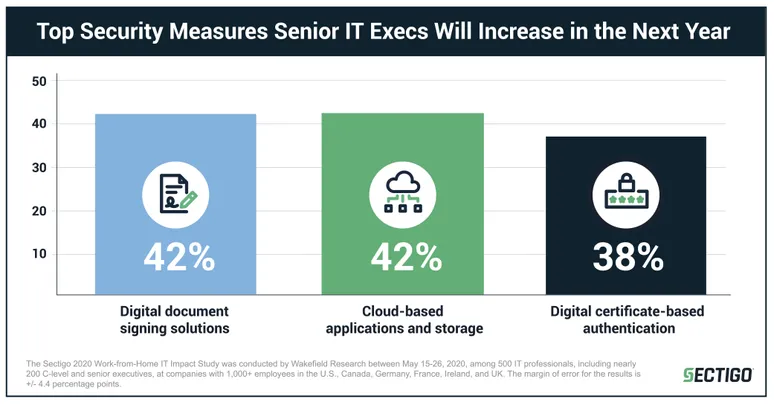Sectigo Survey Finds 93% of IT Execs Concerned About Identity Management, 63% See Increased Employee Productivity, During Widespread Remote Work


The COVID-19 crisis has posed myriad business continuity and security challenges for organizations worldwide. A deeper look into findings from the new Sectigo “2020 Work-from-Home IT Impact Study” reveals distinctions in how C-level and senior executive IT professionals view the transition, security risks, productivity, and outlook related to remote work, compared to those in mid-level and non-management IT positions.
Conducted by independent research firm Wakefield Research, the survey of 500 IT professionals found that of the nearly 200 respondents in CXO or senior executive roles, far more (93%) are likely than non-executive IT professionals (72%) to report challenges with managing the digital identity of users, devices, and processes. The study also found that IT executives are more likely than mid-level and non-management IT professionals to say that employee productivity has increased in the WFH era.
Painful and Risky Transition to Working From Home
- A higher number of CXOs and senior executives (50%), compared to 44% of IT professionals overall, report delaying cybersecurity initiatives for a month or longer to prioritize remote work setup.
- 72% say their business was not set up for remote work before the pandemic; 41% quickly invested in systems to accommodate extensive WFH and 31% bootstrapped systems or didn’t make any changes.
- 95% of senior executives surveyed report risks of remote work to their company’s data, systems, and operations, including:
- Security of home or remote Wi-Fi (40%)
- Compliance with company-mandated security protocols (39%)
- Phishing or other malicious emails (38%)
- Zoom-bombing (37%) – a far higher percent than mid-level (27%) and non-management (13) IT professionals (13%)
- C-level and senior executive respondents report using a mix of authentication methods, including traditional usernames and passwords (62%), user identification certificates (60%) SMS-based multi-factor authentication (55%), and hardware token multi-factor authentication (55%), with 37% reporting use of biometrics—more than mid-level (21%) and non-management (15%) respondents.
- 66% are not completely confident that their company can report on its full compliance with industry and government standards related to digital identity during remote work.
- 88% report similar or increased employee productivity at their company, with 63% citing an increase since widespread remote work began—far more than mid-level and non-management IT professionals, who report 40% and 41% increase in productivity, respectively
- 63% believe the number of remote workers at their company will increase after COVID-19
- 69% say security for data and applications at their company will increase once offices reopen—compared to 55% of mid-level and 46% of non-management IT professionals
- Nearly all (98%) will be more likely to implement measures at their company in the next 12 months due to widespread remote work, including increased use of:
- Digital signing solutions (42%)
- Cloud-based apps and storage (42%)
- Digital certificate-based authentication (38%)

Preparing for the New Normal
While IT professionals in senior executive roles concede to project delays when first focused on business continuity, they recognize that productivity has increased and expect that remote work is here to stay, prompting plans to increase security.
“Clearly work from home has demonstrated that companies agile enough to quickly move to a WFH strategy suffered the least, or not at all, and that corporate firewalls are no longer the border to be protected. Identity has surfaced as the new border, and security must now extend to anywhere an identity is used to access corporate resources and data. Just as two-factor has evolved into multi-factor, work from home will evolve to work from anywhere,” explained Ed Giaquinto, CIO, Sectigo.
“Businesses need to embrace new and creative ways to assign and manage trusted identities from anywhere in the world. Solutions based on PKI, which provide superior security with minimal employee effort, are the logical choice for reliably securing identities in this new normal," added Giaquinto.
For more information, including overall study findings and key takeaways related to the Banking sector, download the Sectigo “2020 Work-from-Home IT Impact Study” report.
Survey Methodology
The 2020 Work-from-Home IT Impact Study was conducted by independent research firm, Wakefield Research (www.wakefieldresearch.com), between May 15 – 26, 2020, including 190 C-suite and senior executive IT professionals at companies across industries with at least 1,000 employees in the U.S., Canada, Germany, France, Ireland, and UK. The margin of error for the results is +/- 4.4 percentage points.
About Sectigo
Sectigo is a leading cybersecurity provider of digital identity solutions, including TLS / SSL certificates, DevOps, IoT, and enterprise-grade PKI management, as well as multi-layered web security. As the world's largest commercial Certificate Authority with more than 700,000 customers and over 20 years of experience in online trust, Sectigo partners with organizations of all sizes to deliver automated public and private PKI solutions for securing webservers, user access, connected devices, and applications. Recognized for its award-winning innovation and best-in-class global customer support, Sectigo has the proven performance needed to secure the digital landscape of today and tomorrow. For more information, visit www.sectigo.com and follow @SectigoHQ.